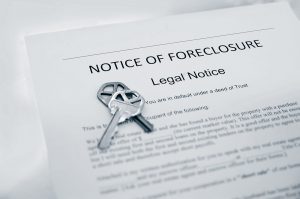
90-Day Pre-foreclosure Notice
Prior to December 20, 2016, New York courts regularly ruled that mortgage lenders should provide notice to homeowners of impending foreclosure at least 90 days prior to accelerating the loan and initiating a foreclosure action with the court, such as in Wells Fargo Bank, N.A. v Tessler. In December 2016, the state legislature codified this requirement into law at Real Property Actions and Proceedings Law (RPAPL) § 1304. N The law clearly states the following requirement:
Notwithstanding any other provision of law, with regard to a home loan, at least ninety days before a lender, an assignee or a mortgage loan servicer commences legal action against the borrower, including mortgage foreclosure, such lender, assignee or mortgage loan servicer shall give notice to the borrower in at least fourteen-point type which shall include the following: “YOU COULD LOSE YOUR HOME. PLEASE READ THE FOLLOWING NOTICE CAREFULLY.”
The law goes on to include the specific language that should be included in the notice. New York provides a specific notice form that lenders can send, as well as forms in six additional languages, which lenders must send if they know a borrower has limited proficiency in English and instead, is proficient in one of the provided languages. As of May 12, 2018, amendments to RPAPL § 1304 now require lenders to provide 90-day pre-foreclosure notices for all reverse mortgage borrowers. Previously, this requirement only applied to forward mortgages.
On the other hand, the New York Supreme Court recently ruled that mortgagees do not have to meet the 90-day notice requirement if they are not a “lender, assignee, or mortgage loan servicer.” NIC Holding Corp. v. Eisenegger, 59 Misc. 3d 1221(A) (N.Y. Sup. Ct. 2018). In that case, the foreclosure plaintiff was an employer who lent an employee funds to purchase a house, and was not in the “business of giving loans collateralized by mortgages for the purchase of residential homes.” Because the court found the mortgagee was not a “lender” under the law’s definition, no 90-day notice was required prior to filing a foreclosure action.
When notice is necessary under the law, lenders must meet specific requirements and demonstrate they issued notice properly, as follows:
- Contents of the notice – The notice letter should be in 14-point font and should inform a borrower they might be at risk of foreclosure, the length and amount of the default, the opportunity of loan modifications or options that may prevent foreclosure, a warning that taking no action could lead to foreclosure, contact information for housing counseling agencies, and notice that the borrower does not have to vacate the home until a court orders them to do so.
- Mailing requirements – Lenders must send notice by both first-class mail and by either certified or registered mail. The lender must use the foreclosure address and the borrower’s last known address, if applicable. The notice should not accompany a mortgage statement or any other communication from the lender.
- Proof of notice – RPAPL § 1306 requires that “Each lender, assignee or mortgage loan servicer shall file with the superintendent of financial services (superintendent) within three business days of the mailing of the notice required.” In addition, New York courts have held that proof of service can require an affidavit of service by someone who is familiar with the lender’s standard mailing practices, or by a receipt from the post office showing the mailing. In certain contexts, other business documents may be acceptable to prove proper mailing, though the court will review these on a case-by-case basis.
If a lender fails to comply with the above laws regarding pre-foreclosure notices, a borrower can seek to have a subsequent foreclosure action dismissed by citing an affirmative defense. In fact, courts have regularly ruled that “The proper mailing of a section 1304 notice is a condition precedent to the commencement of a foreclosure action, and the foreclosing party bear[s] the burden of showing compliance therewith (see Pritchard v Curtis, 101 AD3d 1502, 1504 [3d Dept 2012]). A plaintiff’s failure to show strict compliance requires dismissal (TD Bank, NA v Oz Leroy, 121 AD3d 1256, 1257 [3d Dept 2014], quoting Aurora Loan Servs, LLC v Weisblum, 85 AD3d 95, 103 [2d Dept 2011]).” This means that proving the failure to provide notice can be a powerful tool for defendants to have the foreclosure action dismissed and gain more time to rectify the situation.
In Wells Fargo Bank Natl. Assn. v Wolcott, 2018 NY Slip Op 50127(U), the court notes that “When a movant presents evidence that a mailing was made, the opposing party’s simple denial of receipt is insufficient to rebut the presumption of delivery of the notice.” Instead, a homeowner must demonstrate factual information that indicates the lack of notice. In the above case, the defendant demonstrated her regular practice of opening, retaining, and filing all correspondence from the lender, and she did not have the pre-foreclosure notice. The court found this was more than a “simple denial” and was sufficient to rebut the presumption of notice. This is only one of many cases that address this issue, and your attorney can determine whether you can fight for a dismissal based on lack of proper notice.
Acceleration Notices
A notice of default is different than a notice of acceleration. A notice of acceleration informs a borrower that the entire balance of the loan is due and the lender will no longer accept installment payments in arrears to cure the default. In many mortgage contracts, acceleration happens at the option of the lender, though some contracts may include an automatic acceleration provision under certain circumstances.
The lender may send the borrower notice of acceleration according to their usual business practices. However, in most cases, notice of acceleration happens at the same time as notice of a foreclosure action, as filing a foreclosure action automatically accelerates the loan. Either an elective notice of acceleration or service of a foreclosure action will trigger the statute of limitations of six years under New York law.
If acceleration occurs with the filing of a claim, notice must be given according to the rules of service of process. If no valid service occurs, the acceleration will not be effective and the statute of limitations will not begin to run. If service does occur, an Affidavit of Service must be filed with the court before the case can proceed.
A notice of default that claims a loan “may” be accelerated if not cured does not constitute a notice of acceleration in New York. In addition, a court for the Appellate Division, Second Department recently ruled that a notice stating that a failure to cure the default “will result” in acceleration also does not constitute effective acceleration notice to trigger the statute of limitations. This is an opposite ruling from another intermediate court, which means the New York Court of Appeals may likely weigh in on the matter. We will keep you informed of any new developments as this decision can be important for borrowers trying to defend against foreclosure actions.
It is important to have an attorney review whether the acceleration of your mortgage was valid and whether the statute of limitations has run since the acceleration if no foreclosure case has been filed or refiled. For example, in Kashipour v. Wilmington Savings Fund Society, 144 A.D.3d 985 (2d Dept. 2016), the plaintiff moved to have their mortgage discharged based on the expired statute of limitations. They provided proof of the acceleration in 2009 based on a foreclosure complaint that had been dismissed. The lender never filed another complaint and more than six years passed. The Appellate Court ruled the following in the homeowners’ favor:
Although a lender may revoke its election to accelerate the mortgage, the dismissal of the prior foreclosure action by the court did not constitute an affirmative act by the lender revoking its election to accelerate, and the record is barren of any affirmative act of revocation occurring during the six-year limitations period subsequent to the initiation of the prior action (see Clayton Natl. v Guldi, 307 A.D.2d 982 [2003]; EMC Mtge. Corp. v Patella, 279 A.D.2d 604, 606 [2001]; Federal Natl. Mtge. Assn. v Mebane, 208 AD2d at 894).
This is one of many examples of why the acceleration and deceleration of mortgage debt is critical to homeowners facing possible foreclosure.
In Conclusion
New York courts take the 90-day notice requirements extremely seriously. In many cases, such as Citimortgage Inc. v. Pappas, defendants prevail by demonstrating that notice was not properly served by a lender. This decision is one of many that demonstrates strongly that New York courts will continue to treat the 90-day notice provision with exceptional stringency. Therefore, this is an important matter for defendants to understand to mount a defense and buy some time to reach a settlement or cure a default. This is a very litigious area in foreclosure defense and if handled correctly, can cause issues/delays for the lender. An experienced foreclosure defense lawyer can identify whether this defense can work in your situation.
There can be unique circumstances that lead to an opening for a defendant to challenge foreclosure proceedings based on improper notice. For example,
in some cases, the lender or servicer may change between the time of the 90-day notice and the time of the foreclosure action. In such cases, the lender must provide a very detailed affidavit showing actual knowledge of the procedures used in sending out the notice. In Wells Fargo Bank, N.A. v Yapkowitz, the lender provided an affidavit from its new servicer, which was not the servicer that gave the 90-day notice. The court stated, “the current servicer who apparently has no basis of knowledge that these notices were served—except for the senders’ records which are inadmissible hearsay when offered by the current servicer.”
The court addressed another issue regarding notice in that same case. Specifically, the lender apparently mailed one copy of the notice in one envelope addressed only to one person. However, two spouses were borrowers and both needed to receive proper notice. The court found in the defendants’ favor, ruling, “Plaintiff here could not rely on Fred Yapkowitz to provide RPAPL § 1304 notice to his wife Elaine Yapkowitz. Although the Mortgage allowed Plaintiff to send one notice to only one of the borrowers, it is clear that one joint notice is not sufficient under RPAPL § 1304.” This case is just one example of how unique issues related to improper notice can result in a dismissal of a foreclosure complaint.
Contact Our Long Island Foreclosure Lawyers Right Away
Many people facing foreclosure actions do not realize when lenders failed to meet all the requirements under the law. It is always critical to seek the assistance of an experienced New York foreclosure attorney who can identify any and all possible defenses against the foreclosure action. At the Law Office of Ronald D. Weiss, our legal team has helped many clients find solutions that allow them to keep their homes or otherwise avoid foreclosure. Please call (631) 271-3737 or contact us online for a case evaluation today.




